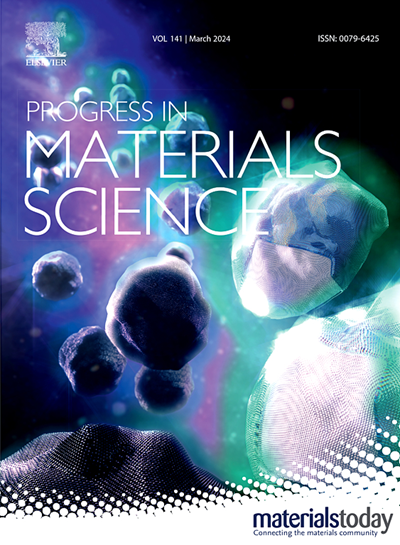Advances and challenges in inorganic bulk-based flexible thermoelectric devices
IF 33.6
1区 材料科学
Q1 MATERIALS SCIENCE, MULTIDISCIPLINARY
引用次数: 0
Abstract
The development of flexible thermoelectric devices (F-TEDs) has significantly improved their thermoelectric performance and unique flexibility, with increasing efforts directed toward standardization and commercialization. Among the various types of F-TEDs, those incorporating all-inorganic bulk materials are more practical and broadly applicable due to the superior thermoelectric performance of these materials compared to F-TEDs using flexible films and fibers. In recent years, innovative design approaches for inorganic bulk-based F-TEDs have emerged, showcasing their distinct advantages. This review provides a timely and comprehensive summary of the research progress on inorganic bulk-based F-TEDs utilizing thermoelectric materials. We begin by discussing advancements in newly developed inorganic bulks, including traditional near-room-temperature bismuth-telluride-based materials, and more recent plastic materials. We then explore design strategies and innovations in inorganic bulk-based F-TEDs, covering areas such as computational modeling, device structures, heat flow analysis, advanced fabrication techniques, diffusion barriers, flexibilization strategies, liquid metal interconnects, and flexible heat sinks. Additionally, we review the testing standards for F-TEDs and highlight the recent application advancements in flexible power generation, cooling, and heating. Finally, we address the current challenges in this field and offer insights into future development prospects. This work is essential for advancing the design, application, standardization, and commercialization of F-TEDs.
无机体基柔性热电器件的进展与挑战
柔性热电器件(F-TEDs)的发展显著提高了其热电性能和独特的灵活性,并朝着标准化和商业化方向不断努力。在各种类型的F-TEDs中,与使用柔性薄膜和纤维的F-TEDs相比,采用全无机块体材料的F-TEDs更具实用性和广泛适用性,因为这些材料的热电性能优越。近年来,无机体基f - ted的创新设计方法已经出现,展示了它们独特的优势。本文对利用热电材料的无机块基F-TEDs的研究进展进行了及时、全面的综述。我们首先讨论新开发的无机块体的进展,包括传统的近室温碲化铋基材料和最近的塑料材料。然后,我们探索了基于无机块体的f - ted的设计策略和创新,涵盖了计算建模、器件结构、热流分析、先进制造技术、扩散屏障、柔性化策略、液态金属互连和柔性散热器等领域。此外,我们回顾了F-TEDs的测试标准,并重点介绍了柔性发电、冷却和加热方面的最新应用进展。最后,我们讨论了该领域目前面临的挑战,并对未来的发展前景提出了见解。这项工作对于推进f - ted的设计、应用、标准化和商业化至关重要。
本文章由计算机程序翻译,如有差异,请以英文原文为准。
求助全文
约1分钟内获得全文
求助全文
来源期刊

Progress in Materials Science
工程技术-材料科学:综合
CiteScore
59.60
自引率
0.80%
发文量
101
审稿时长
11.4 months
期刊介绍:
Progress in Materials Science is a journal that publishes authoritative and critical reviews of recent advances in the science of materials. The focus of the journal is on the fundamental aspects of materials science, particularly those concerning microstructure and nanostructure and their relationship to properties. Emphasis is also placed on the thermodynamics, kinetics, mechanisms, and modeling of processes within materials, as well as the understanding of material properties in engineering and other applications.
The journal welcomes reviews from authors who are active leaders in the field of materials science and have a strong scientific track record. Materials of interest include metallic, ceramic, polymeric, biological, medical, and composite materials in all forms.
Manuscripts submitted to Progress in Materials Science are generally longer than those found in other research journals. While the focus is on invited reviews, interested authors may submit a proposal for consideration. Non-invited manuscripts are required to be preceded by the submission of a proposal. Authors publishing in Progress in Materials Science have the option to publish their research via subscription or open access. Open access publication requires the author or research funder to meet a publication fee (APC).
Abstracting and indexing services for Progress in Materials Science include Current Contents, Science Citation Index Expanded, Materials Science Citation Index, Chemical Abstracts, Engineering Index, INSPEC, and Scopus.
 求助内容:
求助内容: 应助结果提醒方式:
应助结果提醒方式:


